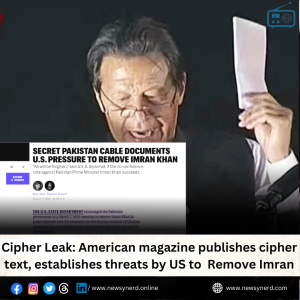Cipher Leak: American magazine publishes cipher text, establishes threats by US to Remove Imran Khan
The Secret Document reveals both the carrots and the sticks that the State Department deployed in its push against Prime Minister Imran Khan.
cipher leak reveals that The U.S. State Department advocated for the removal of Prime Minister Imran Khan during a meeting on March 7, 2022. The urging was based on Khan’s stance of neutrality concerning the Russian invasion of Ukraine.
Cipher leak: influential American publication NameThe Intercepthas disclosed a ciphered message, shedding light on alleged US intentions to remove Imran Khan from power.
A reputable American magazine has made public the encoded content contained within a diplomatic communication sent by the Pakistani ambassador to the foreign office on March 7, 2022. According to the deciphered text, it appears that the encoded message reveals ousted and incarcerated Prime Minister Imran Khan’s claim that a high-ranking US official, Donald Lu, employed menacing language against his government.
Asad Majeed Khan, the Pakistani ambassador to the United States at the time, initiated the encoded message with the following: “I had a luncheon meeting today with Assistant Secretary of State for South and Central Asia, Donald Lu. He changed into followed via way of means of Deputy Assistant Secretary of State Les Viguerie.
Without undue delay, the encrypted communication proceeds to indicate that Don, as referred to in the message, initially discussed Pakistan’s stance regarding the Ukraine crisis, questioning the country’s ostensibly assertive neutral position. Don’s perspective, as outlined in the transcript, highlights that both US and European circles found Pakistan’s posture perplexing. This, he implied, seemed to align with the policy of Prime Minister Imran Khan.

Don then speculated that this position was connected to the ongoing political turmoil in Islamabad, suggesting an effort to project a public facade. The decoded message includes a response to these claims, where Pakistan’s representative asserts that the country’s position on the Ukraine crisis is the outcome of comprehensive interagency consultations. He further emphasizes Pakistan’s avoidance of public diplomacy, attributing the Prime Minister’s remarks during a political rally to a reaction against an impropriety by European Ambassadors in Islamabad.
The most significant revelation emerges subsequently: Don was asked if the substantial US reaction was prompted by Pakistan’s abstention from voting in the United Nations General Assembly (UNGA). He strongly denied this, asserting instead that the reaction stemmed from Prime Minister Imran Khan’s visit to Moscow. .According to Don, if a no-self belief vote in opposition to the Prime Minister succeeded, Washington might be more forgiving due to the perception that the Russia visit was a decision made by the Prime Minister.
He speculated on Europe’s similar reactions. Don mentioned that the idea of the Moscow visit arose during the Beijing Olympics when the Prime Minister attempted to meet Putin, which was unsuccessful, leading to the alternative plan of visiting Moscow.
March 7, 2022 – Pakistani Diplomatic Communication (Transcription)
Today, I had a luncheon meeting with Donald Lu, the Assistant Secretary of State for South and Central Asia. He was accompanied by Les Viguerie, the Deputy Assistant Secretary of State. Along with them, DCM, DA, and Counsellor Qasim joined our discussion.
Right from the start, Don addressed Pakistan’s stance on the Ukraine crisis, expressing concerns that both in Pakistan and Europe, people were questioning why Pakistan was adopting such a strongly neutral stance on Ukraine, if neutrality was even achievable. He found this stance not as neutral as it seemed. Don shared that, based on his discussions with the NSC, it appeared evident that this was the Prime Minister’s policy. He also speculated that this position might be linked to the ongoing political developments in Islamabad and an attempt by the Prime Minister to present a public image. I countered this perspective by explaining that this reading wasn’t accurate. Pakistan’s stance on Ukraine was a product of meticulous interagency discussions, and Pakistan had always upheld diplomacy discreetly. The Prime Minister’s statements during a political rally were a reaction to the European Ambassadors’ public letter, which breached diplomatic norms. I emphasized that any political leader, whether in Pakistan or the U.S., would be compelled to respond publicly under such circumstances.
I inquired whether the strong U.S. reaction was triggered by Pakistan’s abstention from the UNGA voting. Don promptly denied this and attributed it to the Prime Minister’s visit to Moscow. He conjectured that if the motion of no confidence against the Prime Minister succeeded, Washington would be more forgiving as the Russia visit would then be seen as a Prime Ministerial decision. Otherwise, he anticipated difficulties ahead.
He went on to say that he couldn’t predict Europe’s response precisely, but he suspected it would be similar. Don also suggested that there could be a growing isolation of the Prime Minister by Europe and the United States. He hinted that the idea of the Prime Minister’s visit to Moscow might have emerged during the Beijing Olympics, with an initial attempt to meet Putin, which wasn’t successful. This eventually led to the decision for the Moscow visit.
I corrected Don, explaining that this perception was entirely inaccurate. The Moscow visit had been in the planning stages for several years and was the outcome of careful institutional deliberations.
I emphasized that when the Prime Minister traveled to Moscow, the Russian invasion of Ukraine hadn’t begun yet, and hopes for a peaceful resolution persisted. I also highlighted that other European leaders were also visiting Moscow around the same period. Don interjected, differentiating those visits as specific attempts to resolve the Ukraine standoff, whereas the Prime Minister’s visit was driven by bilateral economic interests. I brought attention to the fact that the Prime Minister expressed regret about the situation while in Moscow and hoped for diplomatic solutions.
Stressing that the visit was strictly bilateral, I asserted that it shouldn’t be interpreted as endorsement of Russia’s actions in Ukraine. Our position was guided by the desire to maintain open communication channels with all parties. Our subsequent statements at the UN and through our spokesperson reiterated this while reaffirming our commitment to the UN Charter’s principles: non-use or threat of force, sovereignty, territorial integrity of states, and peaceful dispute resolution.
I also conveyed our concern to Don about how the Ukraine crisis could impact Afghanistan. Given the enduring consequences of the prolonged conflict, we were apprehensive. Our priority was stability and peace in Afghanistan, necessitating collaboration with major powers, including Russia. From this standpoint, the need to keep communication channels open was paramount. This consideration was influencing our stance on the Ukraine crisis as well. Mentioning the upcoming Extended Troika meeting in Beijing, Don informed me of ongoing discussions in Washington whether the U.S. should attend this meeting or the Antalya meeting on Afghanistan, where Russian representatives would be present. Currently, the U.S. was primarily focused on discussing Ukraine with Russia. I expressed our apprehensions that the Ukraine crisis could divert attention from Afghanistan, which was a concern. Don refrained from commenting on this.
I assured Don that, like him, I would also be candid in conveying our perspective. Over the past year, we had consistently perceived reluctance from the U.S. leadership to engage with us. This reluctance fostered a perception in Pakistan that we were being disregarded and perhaps taken for granted. Additionally, we felt that while the U.S. sought our support on matters significant to them, the reciprocal support for issues important to Pakistan, especially Kashmir, was lacking. I emphasized the significance of maintaining effective communication channels at the highest level to dispel this perception.
I also highlighted our surprise that despite the apparent importance of our stance on the Ukraine crisis for the U.S., there had been no engagement at the highest leadership level before the Moscow visit, or even during the UN voting (though the State Department had raised the matter at the DCM level). We valued continued high-level interaction, and thus, the Foreign Minister aimed to speak with Secretary Blinken to personally elucidate Pakistan’s position on the Ukraine crisis. However, this conversation hadn’t occurred yet. Don explained that the prevailing view in Washington was that, given Pakistan’s ongoing political upheaval, this wasn’t the opportune time for such discussions, and they could be deferred until the political situation stabilized.
I reiterated that nations shouldn’t be compelled to pick sides in complex situations like the Ukraine crisis. Instead, active bilateral communication at the political leadership level was crucial. Don acknowledged that I had conveyed our stance clearly and assured me that he would communicate it to his leadership.
I also brought up Don’s defense of India’s position on the Ukraine crisis during a recent Senate Sub-Committee hearing on U.S.-India relations. This gave the impression that the U.S. held different standards for India and Pakistan. Don responded that the strong sentiments of U.S. lawmakers regarding India’s abstentions in the UNSC and UNGA were evident during the hearing. I remarked that it seemed the U.S. expected more from India than from Pakistan, even though more concern was directed towards Pakistan’s stance. Don evaded a direct response, noting that the U.S. perspective on the U.S.-India relationship was significantly influenced by developments in China. He added that once all Indian students left Ukraine, India’s policy might change.
I expressed hope that the issue of the Prime Minister’s Moscow visit wouldn’t harm our bilateral ties. Don countered that, from their viewpoint, it had already impacted the relationship. He suggested waiting a few days to gauge whether the political situation evolved, possibly reducing the disagreement’s magnitude. Alternatively, confronting the issue directly and determining a resolution might be necessary.
We also discussed Afghanistan and other matters related to bilateral relations. Further details of this conversation will be provided in a separate communication.
Assessment
It’s unlikely that Don could have expressed such a forceful demarche without the explicit endorsement of the White House, to which he frequently referred. This suggests that Don’s statements might have exceeded his mandate and touched upon Pakistan’s internal political processes. It’s prudent for us to seriously contemplate this situation and explore the possibility of conveying an appropriate demarche to the Acting Charge d’Affaires in Islamabad.
Who leaked cipher document to US magazine?
The recent controversy encompassing the leaked cipher has entered a fresh phase following journalist Ryan Grim’s revelation about the alleged origin of the leaked cipher document. Grim, known for his groundbreaking story in The Intercept, disclosed that an insider within the Pakistani military provided him with the sensitive document. This revelation was conveyed through a series of tweets.
Journalist Salman Masood’s tweet speculated about the potential involvement of the Pakistan Tehreek-e-Insaf (PTI) in the cipher leak. However, Grim vehemently refuted these assertions in response. He categorically denied that either Imran Khan or any other civilian figure was the source of the leak. In a firm tweet, Grim stated, “I can confidently state that the New York Times’ claim is entirely unfounded. Khan was not our source, and neither was any other civilian. Our source hailed from the Pakistan military. If the Times possesses contradictory proof, it should present it. Otherwise, a retraction is warranted.”
Masood’s initial tweet had suggested a possible link between the PTI and the contentious cable leak. While acknowledging that the leaked cipher’s contents might not inherently prove a conspiracy, Masood pointed out that they underscored existing strains in relationships among key stakeholders, a fact already acknowledged.
As the unfolding drama captures attention, focus now shifts to forthcoming developments and responses from the New York Times and other relevant entities. These responses are eagerly awaited to shed light on the origins of the cipher leak. The evolving particulars are poised to mold the ongoing conversation surrounding the leak and its potential repercussions.
As the drama unfolds, all eyes are on further developments and responses from the New York Times and other relevant parties to clarify the source of the cipher leak. The emerging details are likely to shape the ongoing discourse surrounding the leak and its potential implications.
 Newsy Nerd
Newsy Nerd

